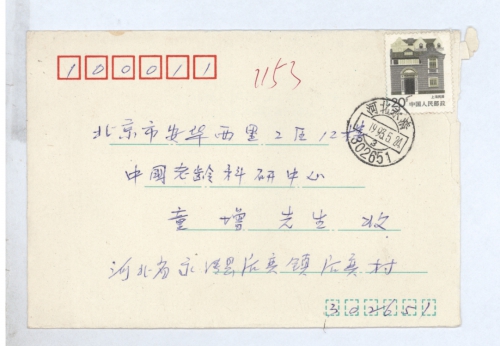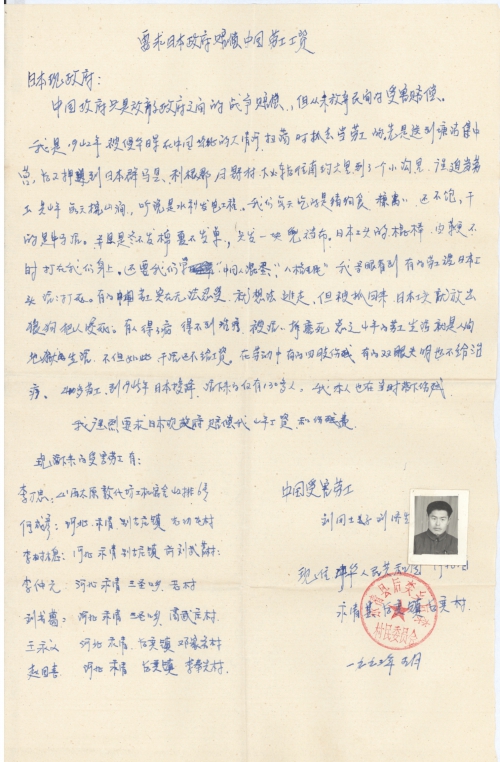Date of letter:1993-05
Address of author:Yongqing County, Shijiazhuang City, Hebei Province
Date of event:1942
Location of event:Daqing River in Hebei Province
Name of author:Liu Jisheng
Name(s) of victim(s):Liu Tuanshi(Liu Jisheng’s father)
Type of atrocity:Slave Laborers(SL)
Other details:In 1942, my father was caught by the Japanese soldiers and forced to do hard labor. The Japanese soldiers escorted the people captured in the mopping-up to Japan and forced them to dig caves every day. They did heavy physical work every day, but were not given enough to eat, and were not provided with cotton-padded clothes in winter. What was more, they were often scolded and beaten by the foreman. Some people got sick, but could not get medical care; some died of illness; some escaped, but were caught again and beaten to death or directly eaten by dogs. I strongly urge the Japanese government to compensate 4 years of wages and disability costs.
Demanding the Japanese government to pay compensation salary to Chinese laborers
Incumbent Japanese government:
Chinese government only abandoned war compensation between countries, but it has never given up civilian damage compensation.
I was captured by the Japanese Invasion Army during the mopping up campaign in Daqing River in North China in 1942 to work as laborer. First we were sent to Tanggu Concentration Camp, later we were escorted to Tsukino Village, Tone County in Gunma Prefecture in Japan, after leaving the train we walked southward for about 6 li before reaching a mountain gully, where we were forced to work as pioneer laborers, each day we dug mountain caves, it was rumored to be a hydraulic power station project. Each day we ate swine and dog feed, bran balls, without ever feeling full, we worked like beasts. In winter there was no cotton padded clothing, in summer there was no unlined garment, instead everyone was only issued a loin cloth. Sticks and whips of the Japanese foreman frequently fell onto our body. They also cursed us “Chinese bastards” and “Bakayaro” in Japanese. I personally witnessed some laborers beaten to death by Japanese foreman. Some Chinese laborers felt the situation intolerable, and tried to escape, but were later captured, the Japanese foreman unleashed hounds to gnaw them to death. Some people fell ill, but were denied treatment, and in this way were tormented to death. In summary, the 4 year long life as laborer was hell on earth, what’s more, there was no pay. During the labor process, some sustained wounds or disability in limbs, some became blind in both eyes but received no treatment. By the time Japan surrendered in 1945, among more than 400 laborers only a little over 130 persons survived. I myself also sustained disability at that time.
I strongly demand the incumbent Japanese government to compensate for 4 years of salary and disability fee.
Surviving victim laborers who are still alive today include:
Li Wanzhong: No. 6, 42 Row, Dunhuafang Machinery Works Dormitory, Taiyuan City, Shanxi
He Chengyan: Laoyoutun Village, Bieguzhuang Town, Yongqing County, Hebei Province
Li Shuhuai: Qianliuwuying Village, Bieguzhuang Town, Yongqing County, Hebei Province
Li Zhongyuan: Yanglao Village, Sanshengkou, Yongqing County, Hebei Province
Liu Shuge: Shangwuzhuang Village, Sanshengkou, Yongqing County, Hebei Province
Wang Yongyi: Dengjiawu Village, Houyi Town, Yongqing County, Hebei Province
Zhao Guoxi: Lifengxian Village, Houyi Town, Yongqing County, Hebei Province
Li Jisheng, son of victim laborer Liu Guotu
Current address: Houyi Village, Houyi Town, Yongqing County, Hebei Province, People’s Republic of China
May 1993
Yonqing County Houyi Town Houyi Villagers’ Committee
(Seal of Villagers’ Committee)
















